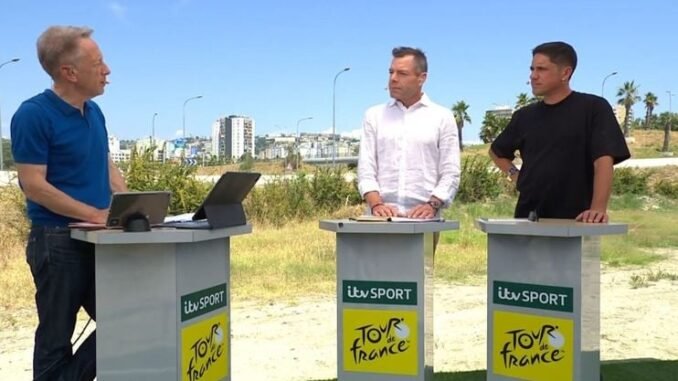
Cycling fans were recently treated to a wave of excitement as the Amaury Sport Organisation (ASO) announced a new TV deal with the European Broadcasting Union (EBU). This agreement ensures that many of the biggest races in cycling will remain free to air across much of Europe until 2030. Among the events included are the Tour de France, La Vuelta a España, Paris-Roubaix, and the iconic Liège-Bastogne-Liège. Fans of women’s cycling will also be pleased to see Tour de France Femmes avec Zwift and other prominent women’s races covered by the new package.
However, this development comes with a downside for UK viewers. From 2026, Warner Brothers Discovery will become the sole broadcaster of the Tour de France in Britain, ending a longstanding tradition of free-to-air coverage on ITV. This marks a significant shift, as British audiences have enjoyed watching the Tour without a paywall for decades. For many, the Tour de France has been synonymous with ITV’s distinctive coverage, a tradition that will sadly end after the 2025 edition.
The end of an era
For over 40 years, the Tour de France has been a fixture on British terrestrial television, bringing the spectacle and drama of the world’s greatest cycling race to living rooms across the country. The current deal will see ITV cover the 2025 Tour, their 25th consecutive edition, before the rights transition fully to Warner Brothers Discovery in 2026. ITV first secured the rights from Channel 4 back in 2001, making the channel the home of the Tour for a generation of British viewers.
ITV’s coverage has not only focused on the sporting drama of the Tour but also celebrated the landscapes, culture, and history of France. Each evening’s highlights show, led by the charismatic Gary Imlach, has become a staple of summer viewing for cycling fans in the UK. Imlach, who has been involved in Tour coverage since 1990, initially on Channel 4, before moving to ITV in 2001, has become the familiar face of British Tour de France coverage. His thoughtful analysis, in-depth interviews, and calm presence have endeared him to fans, making him a beloved figure within the British cycling community.
Joining Imlach are other iconic commentators and pundits who have become synonymous with the Tour. Ned Boulting and David Millar have brought their unique perspectives to the race, blending deep cycling knowledge with a sense of humour and insight. Boulting, with his wit and engaging style, and Millar, with his first-hand experience as a former professional rider, have helped ITV’s coverage strike a balance between informative and entertaining. These commentators have guided viewers through the highs and lows of the race, from thrilling mountain stages to the drama of the Champs-Élysées.
No discussion of Tour de France commentary in the UK would be complete without mentioning Phil Liggett, often referred to as “the voice of cycling.” Though his primary role has shifted over the years, Liggett’s distinctive voice, marked by passion and years of experience, remains etched in the minds of fans. For many, Liggett’s commentary has been an integral part of the Tour de France experience, and his presence contributed significantly to the British enthusiasm for the event.
ITV’s influence on British cycling
ITV’s coverage of the Tour de France coincided with a golden age for British cycling. The channel’s audience grew substantially throughout the 2010s, as British riders such as Bradley Wiggins and Chris Froome achieved unprecedented success in the Tour. The emergence of Team Sky (now INEOS Grenadiers) as a dominant force further spurred interest, as Wiggins became the first British winner of the Tour in 2012, followed by Froome’s four victories. ITV’s coverage captured these moments with flair, turning British cyclists into household names and sparking a surge in interest in the sport.
ITV’s coverage also had an almost ritualistic element to it, with the iconic theme tune that played throughout the Tour’s broadcasts. For many British fans, the theme music became synonymous with the excitement of July, when the Tour de France’s drama unfolds daily. It was not just about the racing but about the way the music set the tone, building anticipation for the next stage. This theme tune, along with the familiar faces of Imlach, Boulting, and Millar, became a beloved part of the British summer.
Shifting trends
The departure of the Tour de France from ITV is not an isolated incident. It reflects a broader trend in sports broadcasting, where major events are increasingly moving behind paywalls. The Champions League, once a staple of ITV’s sports programming, is now exclusively available on subscription services. Similarly, other major competitions like cricket’s Test matches and Formula 1 have also transitioned away from free-to-air television in the UK, limiting access for casual fans.
While Eurosport, which will continue to broadcast the Tour, is widely praised for its comprehensive cycling coverage, there is something uniquely special about ITV’s presentation. It’s not merely about the accessibility; it’s about the familiarity, the storytelling, and the connection with the audience that ITV has built over decades. Eurosport’s coverage, though excellent in its own right, lacks the warmth and distinctiveness that ITV has provided to British fans
Leave a Reply